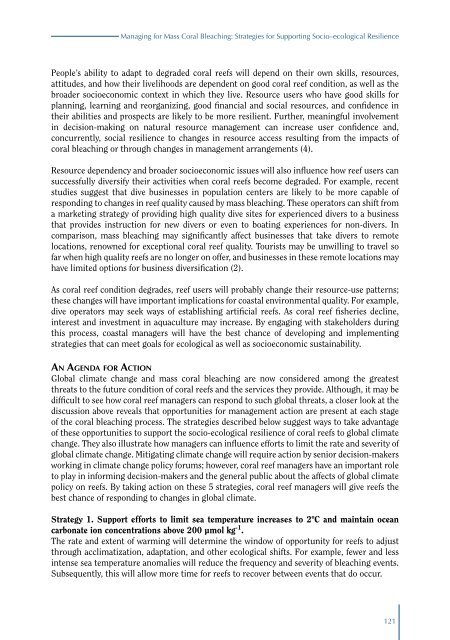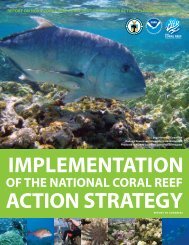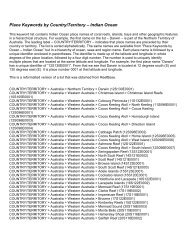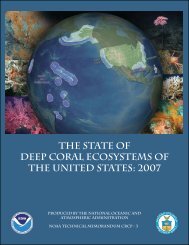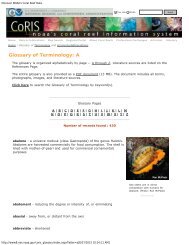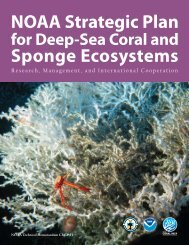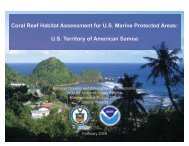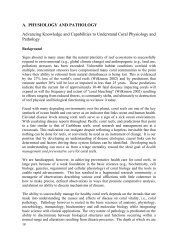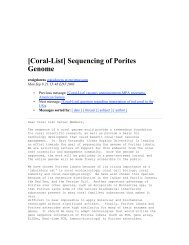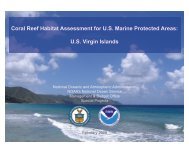Status of Caribbean coral reefs after bleaching and hurricanes in 2005
Status of Caribbean coral reefs after bleaching and hurricanes in 2005
Status of Caribbean coral reefs after bleaching and hurricanes in 2005
You also want an ePaper? Increase the reach of your titles
YUMPU automatically turns print PDFs into web optimized ePapers that Google loves.
Manag<strong>in</strong>g for Mass Coral Bleach<strong>in</strong>g: Strategies for Support<strong>in</strong>g Socio–ecological ResiliencePeople’s ability to adapt to degraded <strong>coral</strong> <strong>reefs</strong> will depend on their own skills, resources,attitudes, <strong>and</strong> how their livelihoods are dependent on good <strong>coral</strong> reef condition, as well as thebroader socioeconomic context <strong>in</strong> which they live. Resource users who have good skills forplann<strong>in</strong>g, learn<strong>in</strong>g <strong>and</strong> reorganiz<strong>in</strong>g, good f<strong>in</strong>ancial <strong>and</strong> social resources, <strong>and</strong> confidence <strong>in</strong>their abilities <strong>and</strong> prospects are likely to be more resilient. Further, mean<strong>in</strong>gful <strong>in</strong>volvement<strong>in</strong> decision-mak<strong>in</strong>g on natural resource management can <strong>in</strong>crease user confidence <strong>and</strong>,concurrently, social resilience to changes <strong>in</strong> resource access result<strong>in</strong>g from the impacts <strong>of</strong><strong>coral</strong> <strong>bleach<strong>in</strong>g</strong> or through changes <strong>in</strong> management arrangements (4).Resource dependency <strong>and</strong> broader socioeconomic issues will also <strong>in</strong>fluence how reef users cansuccessfully diversify their activities when <strong>coral</strong> <strong>reefs</strong> become degraded. For example, recentstudies suggest that dive bus<strong>in</strong>esses <strong>in</strong> population centers are likely to be more capable <strong>of</strong>respond<strong>in</strong>g to changes <strong>in</strong> reef quality caused by mass <strong>bleach<strong>in</strong>g</strong>. These operators can shift froma market<strong>in</strong>g strategy <strong>of</strong> provid<strong>in</strong>g high quality dive sites for experienced divers to a bus<strong>in</strong>essthat provides <strong>in</strong>struction for new divers or even to boat<strong>in</strong>g experiences for non-divers. Incomparison, mass <strong>bleach<strong>in</strong>g</strong> may significantly affect bus<strong>in</strong>esses that take divers to remotelocations, renowned for exceptional <strong>coral</strong> reef quality. Tourists may be unwill<strong>in</strong>g to travel s<strong>of</strong>ar when high quality <strong>reefs</strong> are no longer on <strong>of</strong>fer, <strong>and</strong> bus<strong>in</strong>esses <strong>in</strong> these remote locations mayhave limited options for bus<strong>in</strong>ess diversification (2).As <strong>coral</strong> reef condition degrades, reef users will probably change their resource-use patterns;these changes will have important implications for coastal environmental quality. For example,dive operators may seek ways <strong>of</strong> establish<strong>in</strong>g artificial <strong>reefs</strong>. As <strong>coral</strong> reef fisheries decl<strong>in</strong>e,<strong>in</strong>terest <strong>and</strong> <strong>in</strong>vestment <strong>in</strong> aquaculture may <strong>in</strong>crease. By engag<strong>in</strong>g with stakeholders dur<strong>in</strong>gthis process, coastal managers will have the best chance <strong>of</strong> develop<strong>in</strong>g <strong>and</strong> implement<strong>in</strong>gstrategies that can meet goals for ecological as well as socioeconomic susta<strong>in</strong>ability.An Ag e n da f o r Ac t i o nGlobal climate change <strong>and</strong> mass <strong>coral</strong> <strong>bleach<strong>in</strong>g</strong> are now considered among the greatestthreats to the future condition <strong>of</strong> <strong>coral</strong> <strong>reefs</strong> <strong>and</strong> the services they provide. Although, it may bedifficult to see how <strong>coral</strong> reef managers can respond to such global threats, a closer look at thediscussion above reveals that opportunities for management action are present at each stage<strong>of</strong> the <strong>coral</strong> <strong>bleach<strong>in</strong>g</strong> process. The strategies described below suggest ways to take advantage<strong>of</strong> these opportunities to support the socio-ecological resilience <strong>of</strong> <strong>coral</strong> <strong>reefs</strong> to global climatechange. They also illustrate how managers can <strong>in</strong>fluence efforts to limit the rate <strong>and</strong> severity <strong>of</strong>global climate change. Mitigat<strong>in</strong>g climate change will require action by senior decision-makerswork<strong>in</strong>g <strong>in</strong> climate change policy forums; however, <strong>coral</strong> reef managers have an important roleto play <strong>in</strong> <strong>in</strong>form<strong>in</strong>g decision-makers <strong>and</strong> the general public about the affects <strong>of</strong> global climatepolicy on <strong>reefs</strong>. By tak<strong>in</strong>g action on these 5 strategies, <strong>coral</strong> reef managers will give <strong>reefs</strong> thebest chance <strong>of</strong> respond<strong>in</strong>g to changes <strong>in</strong> global climate.Strategy 1. Support efforts to limit sea temperature <strong>in</strong>creases to 2ºC <strong>and</strong> ma<strong>in</strong>ta<strong>in</strong> oceancarbonate ion concentrations above 200 μmol kg -1 .The rate <strong>and</strong> extent <strong>of</strong> warm<strong>in</strong>g will determ<strong>in</strong>e the w<strong>in</strong>dow <strong>of</strong> opportunity for <strong>reefs</strong> to adjustthrough acclimatization, adaptation, <strong>and</strong> other ecological shifts. For example, fewer <strong>and</strong> less<strong>in</strong>tense sea temperature anomalies will reduce the frequency <strong>and</strong> severity <strong>of</strong> <strong>bleach<strong>in</strong>g</strong> events.Subsequently, this will allow more time for <strong>reefs</strong> to recover between events that do occur.121


